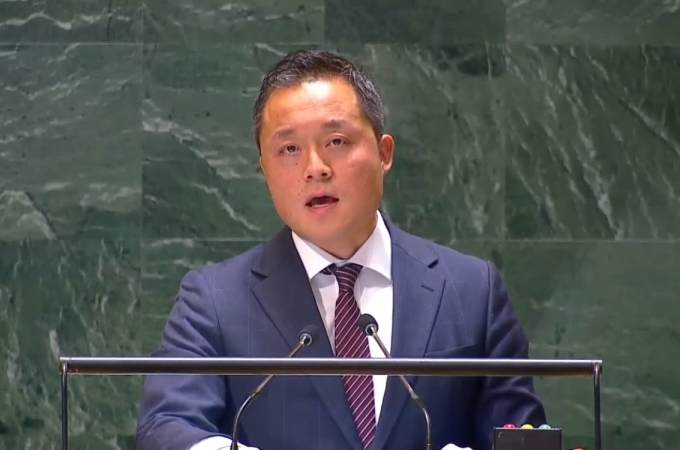Statement by Mr. NAGANO Shunsuke, Counsellor, Permanent Mission of Japan to the United Nations, at the seventy-ninth session of the United Nations General Assembly, 51st plenary meeting on Oceans and the law of the sea (Agenda Item 75 (a))
2024/12/10

(As delivered)
Mr. President,
At the outset, Japan would like to take this opportunity to express our appreciation for the excellent coordination and Member States’ contribution, and the invaluable support from the Division for Ocean Affairs and the Law of the Sea (DOALOS).
First of all, Japan would like to commemorate the 30th anniversary of the entry into force of the United Nations Convention on the Law of the Sea (UNCLOS), which is the foundation of maritime order as “the Constitution for the Oceans”.
As we have done in past years, Japan decided to co-sponsor this important draft resolution, “Oceans and the Law of the Sea”, because we strongly believe in the universal and unified character of UNCLOS, which governs all activities in the oceans and seas, in particular the freedom of navigation and overflight, freedom on the high seas, and the protection and preservation of the marine environment, as well as the peaceful settlement of disputes.
However, in recent years, we have observed developments going against the maritime order based on the rule of law. All maritime claims must be made based on the relevant provisions of UNCLOS, which is the basis for determining legitimate rights and interests of States over maritime zones. It is unacceptable to make legal assertions as if there were general international law that overrides matters comprehensively covered under UNCLOS.
In this respect, Japan has long been advocating “Three Principles of the Rule of Law at Sea”. They are:
- States should make and clarify their claims based on international law.
- States should not use force or coercion in trying to drive their claims.
- States should seek to settle disputes by peaceful means.
Mr. President,
Japan appreciates that the adoption of the BBNJ Agreement in June 2023 has further promoted rule-making regarding biological diversity of areas beyond national jurisdiction. In this regard, Japan is actively participating in the discussions of the Preparatory Commission, in its capacity as a bureau member, in order to contribute to developing sound, effective, and cost-efficient mechanisms for the implementation of the Agreement. The Agreement will secure a balance between ‘conservation’ and ‘sustainable use’ of marine biological diversity, and respect the relevant international instruments, frameworks, and bodies.
It is a shared recognition that a task of the highest priority for the International Seabed Authority is the adoption of regulations on exploitation of mineral resources in the Area, which is a clear requirement provided for in UNCLOS. Japan attaches great importance to the development of regulations which strike a reasonable balance between the protection and preservation of the marine environment, and the exploitation of mineral resources in the Area, based on sufficient scientific knowledge.
Mr. President,
Japan reiterates its serious concern about the adverse effects of climate change on the oceans and seas. As a maritime country, Japan is particularly keen on addressing the impact of sea-level rise caused by climate change. Sea-level rise is another pressing issue the international community is facing today, and it has direct relevance to peace and security around the world, because many countries including island States are exposed to imminent threats and various uncertainties caused thereby.
Legal stability and predictability based on international law are the necessary foundations for States in tackling the challenges posed by sea-level rise. For this reason, the primacy of UNCLOS which sets out the legal framework within which all activities in the oceans and seas must be carried out, needs to be maintained.
In this regard, Japan has officially stated its position that it is permissible to preserve the existing baselines and maritime zones established in accordance with UNCLOS, notwithstanding the regression of coastlines caused by climate change.
Japan appreciates the work on this matter by the International Law Commission since 2019, and hopes that, in parallel with that work, the discussion will be further deepened among States.
Mr. President,
Japan will continue to cooperate with fellow Member States that share our common belief in the importance of the rule of law as a universal value, and make persistent efforts to this end, especially to continue to ensure a free and open Indo-Pacific.
In closing, let me reiterate Japan’s wish that the draft resolution “Oceans and the Law of the Sea”, which is the result of persistent work by Member States, will be duly adopted by the General Assembly.
I thank you, Mr. President.
